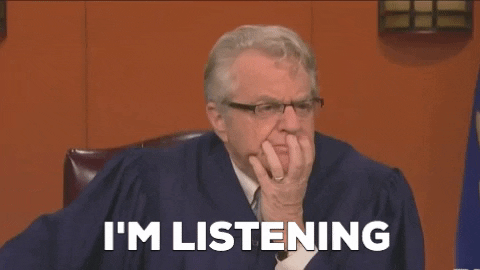68. Active Listening for Parents
A few tips for being a less distracted/better listener this week.
Starting the shorter(er) week off with some tips for something my own kids have called me out on recently…being a distracted listener.
While I’d like to say I’m a perfect parent who is always listening intently every time my kids have something to tell me, that’s obviously not the case 🙀
Like anyone I can be distracted while talking with my kids, because there are a million things we as adults have going on all around us seemingly all the time and I’m human.
Phones dinging and buzzing, noise from other siblings, paying attention to traffic, to-do lists…Like a lot of things are vying for our attention 24/7 and listening to someone talk about Roblox or the substitute teacher can easily go in one ear and out the other.
And hey that happens 🤷♀️
But the other day my 9 year old son tested me mid-conversation to make sure I was listening, sensing I was distracted and not actually hearing what he was saying.
Clearly noticing that while I was looking right at him, on the inside I was somewhere else… which just so happened to be crafting a rebuttal email in response to something that had annoyed me earlier in the day.
Calling me on it in his own 9 year old way.
Something that I actually love that he does.
Because, he was right after all.
I wasn’t listening as well as I could have been in that moment and we all need those wake up calls now and again.
And while I could have easily snapped back and said something snarky or dismissed my behavior, I didn’t.
Instead I just apologized…
”You’re right, I wasn’t listening, I was distracted by something from work. Can we start over?”
So for take 2 of his story, I mustered up all my active listening skills I use at work all day and actually listened to the story he needed to tell me.
Was it a groundbreaking and deep conversation?
Nope, just a regular everyday story.
But did he have a need for me to be fully engaged with him for whatever reason?
Apparently so!
And I’m glad he advocated for me to be “here and now” for him in that moment.
Because as any parent who has kids in school all day knows, our time with them is limited during the week. And in the hustle and bustle of coming home from work and school, cleaning out backpacks, and getting dinner started before activities, showers and bedtime, sometimes we just need to connect and tell someone something.
I want to connect just as much as they do and one way to do that is to be all in with them for even just a few moments to really hear something they have to say.
For those times when you have a million things to do, and your child needs to tell you something…
Tips for really listening to what they’re saying.
Oh and before we get started these aren’t a “how to” lesson.
More like a buffet of listening skills to choose from.
Find what works for you and take it out for a test drive.
Put away devices and limit other distractions. Get phones and iPads out of the way and limit other distractions (turn off the stove, give little siblings a snack or activity).
“Listen” with eyes + ears. When we are being active listeners we can take in more than the words our kids are saying. Watching their body language and non-verbal cues (teary eyes, furrowed brow) and also listening for the tone beneath the words which could give us clues as to underlying emotion of the story. Some people call this “listening with your eyes, ears and heart”.
Don’t interrupt and use non-verbal cues: Non-verbal cues, such as nodding or smiling, can signal to your child that you are actively listening and understanding (because you actually are!). These cues might even get them to share more than they might have otherwise, a bonus for kids who don’t usually have much to say about their day.
Offer reflective responses: Respond to your child in a way that reflects back what you’re hearing they've said. These responses can sound like “She pushed you and then she ran away?” or “It sounds like you felt left out…” These responses aren’t about giving feedback, just simply listening and letting your child know you’re listening. With the added bonus of actually keeping YOU present and engaged.
Practice the pause, ask clarifying questions and lead with empathy. It’s so easy to jump into problem solving mode and offer up opinions and solutions when talking with our kids. Which can lead to us listening to respond, not listening to understand. Pausing before responding makes us get intentional about what comes out of our mouths. Allowing us to lead with responses that might be more helpful to us and them, like using clarifying questions to better understand the situation “So did this happen at the start of end of recess?” and leading with empathy “You must have been so confused when that happened.”
And you can always ask for a better time to talk! Sometimes we just can’t be all there to listen, and that’s ok. Saying to your child “I’m super distracted right now, after I’m done with this can I come find you and we can pick up where we left off?”
OK folks, there you have it….
What is one skill you can be intentional about using this week, either with your kids or someone else in your life?
Have a good week and chat soon!




